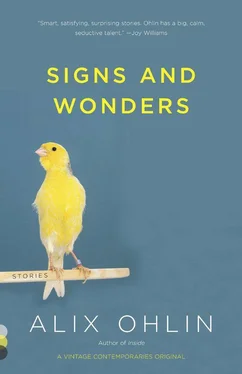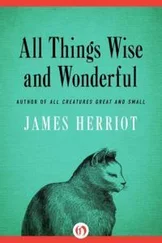Alix Ohlin - Signs and Wonders
Здесь есть возможность читать онлайн «Alix Ohlin - Signs and Wonders» весь текст электронной книги совершенно бесплатно (целиком полную версию без сокращений). В некоторых случаях можно слушать аудио, скачать через торрент в формате fb2 и присутствует краткое содержание. Год выпуска: 2012, ISBN: 2012, Издательство: Random House, Inc., Жанр: Современная проза, на английском языке. Описание произведения, (предисловие) а так же отзывы посетителей доступны на портале библиотеки ЛибКат.
- Название:Signs and Wonders
- Автор:
- Издательство:Random House, Inc.
- Жанр:
- Год:2012
- ISBN:9780307948649
- Рейтинг книги:3 / 5. Голосов: 1
-
Избранное:Добавить в избранное
- Отзывы:
-
Ваша оценка:
- 60
- 1
- 2
- 3
- 4
- 5
Signs and Wonders: краткое содержание, описание и аннотация
Предлагаем к чтению аннотацию, описание, краткое содержание или предисловие (зависит от того, что написал сам автор книги «Signs and Wonders»). Если вы не нашли необходимую информацию о книге — напишите в комментариях, мы постараемся отыскать её.
Signs and Wonders — читать онлайн бесплатно полную книгу (весь текст) целиком
Ниже представлен текст книги, разбитый по страницам. Система сохранения места последней прочитанной страницы, позволяет с удобством читать онлайн бесплатно книгу «Signs and Wonders», без необходимости каждый раз заново искать на чём Вы остановились. Поставьте закладку, и сможете в любой момент перейти на страницу, на которой закончили чтение.
Интервал:
Закладка:
Sophie wanted to disappear, but the only other room was their bedroom, and she couldn’t very well go in there. “We can do whatever,” she said. “I’m easy.”
Fiona looked at her and tried to smile. “You’re such a sweetheart,” she said, then added bitterly, “It’s hard to believe you’re related.”
“Hey,” Philip said.
Sophie tried again. “Maybe we could have dinner here, and then you and I could do something,” she told Fiona. “A movie or something. There must be tons of stuff I couldn’t see anywhere else.”
“This isn’t about you and me spending time together,” Fiona snapped.
Sophie stepped back. And then again, to sit down.
“You get these ideas, and you can’t handle any deviation,” Philip said. “Everything has to go according to your plan.”
“There’s nothing wrong with having a plan,” Fiona said. “If you don’t have a plan, you don’t get anywhere.”
“Maybe I like where I am.”
“I have to push you to do everything. If it weren’t for me, you’d never do anything. You’d just live here alone for the rest of your life. That’s what you want, isn’t?”
“It’s looking pretty good right about now,” Philip said.
Fiona went into the bedroom, leaving Sophie and her brother alone.
Philip ordered Chinese without asking her what she wanted, and the two of them watched basketball. He switched to beer and gave her one, which she drank quickly. The second she pulled out of the fridge herself. An hour later Fiona came out of the bedroom carrying her jacket and walked straight out the door without saying anything.
“Are you going after her?” Sophie said.
Her brother shrugged. “She can take care of herself.”
Sophie thought of her parents worrying every time she left the house, how her mother sometimes called her first thing in the morning at school, as if she might not have survived the night, and about how they both cried when they left her in Boston at the beginning of college, Sophie herself dry-eyed and itching to be alone. Now she too walked out of the apartment.
“Hey,” Philip said, but that was the extent of his interference. After riding the elevator down, Sophie stood in the street wondering where Fiona had gone. Though it was late there were still tons of people out walking around, there were cabs and cars. A person could go anywhere and do anything. It was cold. Nobody looked at her; nobody asked what she was doing. Helpless, wordless, she went back inside. By the time she fell asleep on the couch, Fiona still hadn’t come home.
Her train wasn’t until noon, and Sophie woke up worrying about how to get through the last few hours of the visit. But Fiona and Philip were in the kitchen making French toast. Sitting up, she saw that he had his arms around her waist, and Fiona was laughing, a low, sweet murmur. Then they started kissing. If Sophie’s parents had never fought in front of her, they’d never kissed in front of her either, a discretion she approved of completely. As she watched, Fiona moved one of Philip’s hands so his palm lay flat on her stomach, and she rubbed it against herself, as if she were a magic lantern.
She faked sleep until Fiona shook her shoulder gently. Together they stripped the couch, folding the blanket as Sophie been taught to in Girl Scouts, Fiona holding one end and Sophie walking the other up to her and pressing it to her chest.
Fiona’s eyes were sparkling. “Thanks for coming to look for me last night,” she said.
“Oh, it was nothing.”
“It’s not nothing. He learned something from you. He doesn’t understand things sometimes, because of how he grew up. He thinks everybody gets to choose who they love.”
Sophie didn’t know what this meant, but nodded as if she did. Then Philip served the French toast. He was in a great mood and kept telling Sophie that she had to come back, that the couch would be reserved for her.
“Consider it your pied-à-terre,” he told her.
She didn’t know what this meant, either, but could tell he was proud of the phrase. Over the three days they’d spent together she’d at least learned this much about him.
They ate breakfast while reading the newspaper. After a while Sophie took a shower and packed her bag. She was already thinking about school, the party she’d missed by being here, what she’d say to her mother when she called that night.
“Hey,” Philip said, “what are you doing for Thanksgiving? You could spent it here with us.”
“I’m supposed to go home,” Sophie said. She bit her lip, hesitating, then took a chance. “Why don’t you guys come out there? Mom and Dad would love it.”
“We’ll see,” Fiona said. She was standing next to Philip, moving her left hand with its bright engagement ring up and down his arm. “I’m not sure I’ll feel up to traveling. As you can tell, I’m already pretty hormonal.”
Sophie looked at her brother.
“Fiona’s pregnant,” he said.
“Oh, wow,” Sophie said, as Fiona stared at her with an expectant smile. “Congratulations,” she remembered to say.
“Thank you! We’re thrilled,” Fiona said, and her stroking picked up its pace. She was beaming. This was her show; the whole weekend, Sophie thought, had been her show. Even the letter. She thought of how her mother had sounded on the day the letter came, when she said, “I always thought of him, wondering where he was, every minute of every day.” Unspoken was the idea that, somewhere off in the world, he had been thinking of her too.
“I should go,” Sophie said.
They offered to take her to the station, but Sophie refused. She wanted to be alone, to plan her phone call that evening. It was as if we’d known each other all our lives. It was her turn now to leave out everything that couldn’t be said. The last thing her brother offered, as she left, was “Keep in touch,” as if they were high school friends whom college choices might force apart. Fiona jumped in: they had friends in Boston, so they’d come visit and take Sophie and her roommate out to dinner. Sophie believed her. She would drag Philip to Boston and probably, eventually, to California, taking him everywhere there was family, people to whom he was connected.
Indeed, this is what happened. The child was born and named Andrew, and he looked like Sophie and Philip: the same red hair, the same boxy face. When Fiona brought him to California, she presented him like a trophy to Sophie’s mother, who exclaimed happily over him, and said all the right things, and it wasn’t until after the visitors left that she locked herself in the bedroom and cried over everything she had lost: a whole child’s future, a whole child’s past.
On a drunken Thanksgiving years later, Fiona would confess to Sophie that she wanted to have other children after Andrew, but that Philip was against it; too much money and time would be required. “He doesn’t understand about family,” she said, this initial grain of suspicion having hardened to a sturdy pearl. Sophie, with four glasses of wine in her and struggling through divorce, could only nod exhaustedly, too drunk to remember Fiona as a young woman aglow with her child and her confidence and her love. Whether she remembered it or not, though, this was the end of her own childhood: the day she left Fiona and her brother in New York, Fiona waving good-bye with one hand and holding on to Philip with the other, as if without this tether he might float away into some other orbit. This escape Fiona would not allow. Instead she held his arm and smiled at Sophie, her eyes sparkling fervently, amply sparkling, as if she felt so full of love that she could afford to give some away.
Three Little Maids

Интервал:
Закладка:
Похожие книги на «Signs and Wonders»
Представляем Вашему вниманию похожие книги на «Signs and Wonders» списком для выбора. Мы отобрали схожую по названию и смыслу литературу в надежде предоставить читателям больше вариантов отыскать новые, интересные, ещё непрочитанные произведения.
Обсуждение, отзывы о книге «Signs and Wonders» и просто собственные мнения читателей. Оставьте ваши комментарии, напишите, что Вы думаете о произведении, его смысле или главных героях. Укажите что конкретно понравилось, а что нет, и почему Вы так считаете.












